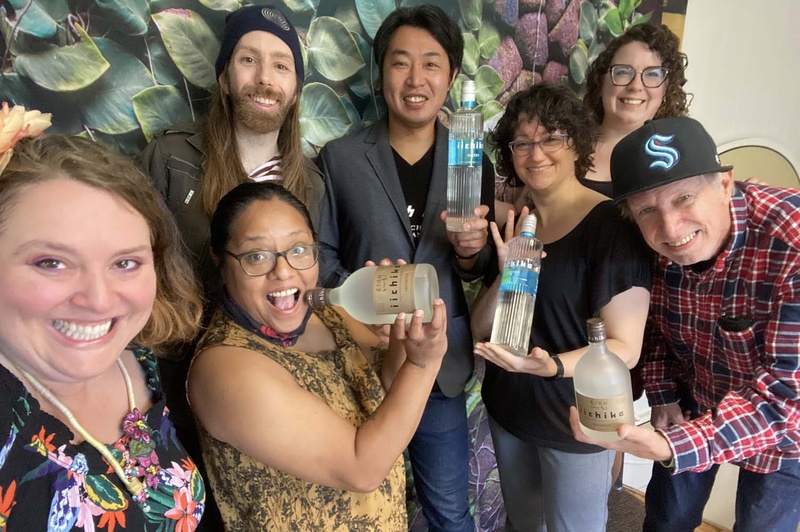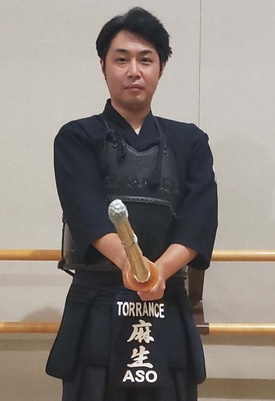Putting shochu on a par with distilled spirits around the world
There are many different types of Japanese shochu available in the Japanese market in the U.S. One of them, Iichiko from Oita Prefecture, is a very famous brand in Japan, but it is still difficult to say that it is well known in the U.S. market, even among people other than Japanese people living in the U.S.
In this climate, Aso Masato, sales manager at Iichiko USA, Inc., expressed his enthusiasm and expectations, saying, "We are working to have shochu recognized as a global drink. Although it is not yet well known around the world, our goal is to make Japanese shochu a drink that can compete in the mainstream alongside whiskey, gin, vodka, and tequila. This may take a considerable amount of time. For example, Japanese whiskey is currently booming in the United States, but it has taken 30 or 40 years to get to this point. We are prepared for it to take a similar amount of time with shochu, but with the rise of social media, we may be able to achieve our goal in three years."
He also says he is actively working to expand into American bars so that shochu will be recognized as a cocktail ingredient on par with vodka and tequila.
Aso was assigned to the United States in April 2019. He was then ordered to return to Japan due to the pandemic, so he left the United States for a year, making his total assignment two years.
"Although I only have two years of experience, I have exhibited at exhibitions around the United States and let American customers taste Iichiko, and I feel that it is a success. When people drink it, they say it is 'really delicious.' Some people drink it three or four times, and I am confident that if we can get it to people's mouths, shochu will be accepted."
Aso says that by introducing Americans who are unfamiliar with shochu to traditional ways of drinking it, such as on the rocks or with hot water, and by going beyond shochu alone and introducing dishes that go well with shochu, they are also focusing on educating people about shochu and the culture surrounding it.
American Kindness and Coldness
Aso is originally from Oita Prefecture. After graduating from a university outside the prefecture, he hoped to find work in his hometown of Oita. "I had worked part-time at a restaurant during my student days, so I was interested in the food and beverage industry. That's why I applied to Sanwa Shurui (the manufacturer and distributor of Iichiko), a local food and beverage company." After joining the company, Aso worked in a factory for several years, and then worked as a salesman for the domestic market for nearly 10 years. During this time, while continuing his work as a salesman, he secretly harbored the goal of "working in America in the future."
His first visit to America was on his graduation trip. Aso flew to New York alone with a copy of "Travelling Around the World." "It was almost 20 years ago, and there were no smartphones at the time. I didn't know which way to go, and I was simply overwhelmed by the skyscrapers. Until then, I had never even walked alone in Tokyo (laughs). When I was spreading out a map in the streets of New York, people would call out to me and tell me the way, and some even accompanied me to my destination. On the other hand, in the financial district, I encountered a man who looked like a businessman who asked me for directions to tease me for being lost. During my first visit to New York, I experienced the warmth of people, but also the coldness of them." From that moment, Aso's heart began to have the desire to "go to America someday," and in 2019, that desire became a reality.
So what have he discovered while continuing his work to promote shochu in America? "Japanese society has a certain closed side to it, and it's hard to feel like it's connected to the world. But there are many people in America who have been successful in business, and I've encountered new opportunities, so I've gained a sense of being connected to the world and at the same time, I think my perspective has changed. I've also realized that there are more possibilities for the future, so for example, even if I get an order to return to Japan from America, it doesn't have to be America, and I've changed my mind to think that I should be able to do a lot of things wherever I am. Even if it's not Japan but Asia, I'm confident that I can sell Japanese shochu there. I'm no longer tied to a particular location."
Trust is the basis of everything
Next, I asked whether there are any differences between his sales style in Japan and his style in the United States.
"What I think now is that Japan and America are essentially the same. That is, before sales techniques come into play, trust is the basis of everything. It's not about because it's cheap or the conditions are good or anything like that. It's a relationship between human beings. There are aspects of sales in Japan as well."
We asked him where he wants to be in 10 years' time.
"I would like to be involved in making our own brand Iichiko famous not only in America but all over the world, and in creating a world where people can drink shochu as a matter of course. I don't mind if I'm not on the front lines of sales, even if I'm supporting younger employees. It's been 15 years since I joined the company, and I love Iichiko so much that I even have the license plate number for my car in Japan read "1115 (Iichiko)". People around me ask me what I'm doing even though I'm not the owner (laughs)."
Finally, what do you want to do outside of work while you're in the US?
"I learned here that there are many people practicing kendo in America. I have been practicing kendo for 14 years and continue to practice in America. If possible, while I am in America I would like to pass the promotion exam to move up from my current fourth dan to fifth dan. I would also like to interact with people as a member of the American kendo community and understand more about America. I believe that will be a valuable asset for me."
© 2022 Keiko Fukuda







